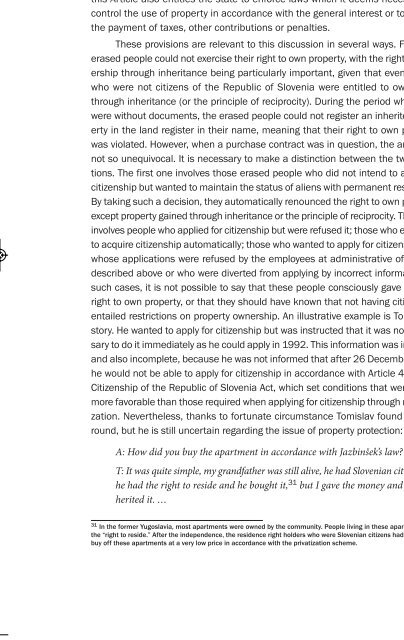The Scars of the Erasure_web
The Scars of the Erasure_web
The Scars of the Erasure_web
- No tags were found...
You also want an ePaper? Increase the reach of your titles
YUMPU automatically turns print PDFs into web optimized ePapers that Google loves.
<strong>Erasure</strong>_4a 10.1.11 20:29 Page 115THE ERASURE AS A VIOLATION OF LEGALLY PROTECTED HUMAN RIGHTS115also specified in Article 1 <strong>of</strong> Protocol 1 to <strong>the</strong> ECHR, which states that every natu -ral or legal person has <strong>the</strong> right to respect for his property and that no one shallbe deprived <strong>of</strong> his property except in <strong>the</strong> public interest and in accordance with<strong>the</strong> conditions provided by law and <strong>the</strong> principles <strong>of</strong> international law. However,this Article also entitles <strong>the</strong> state to enforce laws which it deems necessary tocontrol <strong>the</strong> use <strong>of</strong> property in accordance with <strong>the</strong> general interest or to ensure<strong>the</strong> payment <strong>of</strong> taxes, o<strong>the</strong>r contributions or penalties.<strong>The</strong>se provisions are relevant to this discussion in several ways. First, <strong>the</strong>erased people could not exercise <strong>the</strong>ir right to own property, with <strong>the</strong> right to ownershipthrough inheritance being particularly important, given that even peoplewho were not citizens <strong>of</strong> <strong>the</strong> Republic <strong>of</strong> Slovenia were entitled to ownershipthrough inheritance (or <strong>the</strong> principle <strong>of</strong> reciprocity). During <strong>the</strong> period when <strong>the</strong>ywere without documents, <strong>the</strong> erased people could not register an inherited propertyin <strong>the</strong> land register in <strong>the</strong>ir name, meaning that <strong>the</strong>ir right to own propertywas violated. However, when a purchase contract was in question, <strong>the</strong> answer isnot so unequivocal. It is necessary to make a distinction between <strong>the</strong> two situations.<strong>The</strong> first one involves those erased people who did not intend to apply forcitizenship but wanted to maintain <strong>the</strong> status <strong>of</strong> aliens with permanent residence.By taking such a decision, <strong>the</strong>y automatically renounced <strong>the</strong> right to own propertyexcept property gained through inheritance or <strong>the</strong> principle <strong>of</strong> reciprocity. <strong>The</strong> o<strong>the</strong>rinvolves people who applied for citizenship but were refused it; those who expectedto acquire citizenship automatically; those who wanted to apply for citizenship butwhose applications were refused by <strong>the</strong> employees at administrative <strong>of</strong>fices asdescribed above or who were diverted from applying by incorrect information. Insuch cases, it is not possible to say that <strong>the</strong>se people consciously gave up <strong>the</strong>irright to own property, or that <strong>the</strong>y should have known that not having citizenshipentailed restrictions on property ownership. An illustrative example is Tomislav’sstory. He wanted to apply for citizenship but was instructed that it was not necessaryto do it immediately as he could apply in 1992. This information was incorrectand also incomplete, because he was not informed that after 26 December 1991he would not be able to apply for citizenship in accordance with Article 40 <strong>of</strong> <strong>the</strong>Citizenship <strong>of</strong> <strong>the</strong> Republic <strong>of</strong> Slovenia Act, which set conditions that were muchmore favorable than those required when applying for citizenship through naturali -zation. Never<strong>the</strong>less, thanks to fortunate circumstance Tomislav found his wayround, but he is still uncertain regarding <strong>the</strong> issue <strong>of</strong> property protection:A: How did you buy <strong>the</strong> apartment in accordance with Jazbinšek’s law?T: It was quite simple, my grandfa<strong>the</strong>r was still alive, he had Slovenian citizenship,he had <strong>the</strong> right to reside and he bought it, 31 but I gave <strong>the</strong> money and later inheritedit. …31 In <strong>the</strong> former Yugoslavia, most apartments were owned by <strong>the</strong> community. People living in <strong>the</strong>se apartments had<strong>the</strong> “right to reside.” After <strong>the</strong> independence, <strong>the</strong> residence right holders who were Slovenian citizens had <strong>the</strong> right tobuy <strong>of</strong>f <strong>the</strong>se apartments at a very low price in accordance with <strong>the</strong> privatization scheme.


